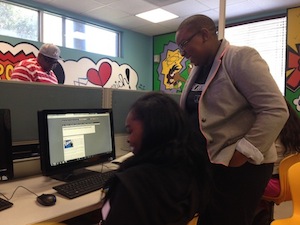Why A Business Owner Is Teaching South Florida Students To Write Computer Code
Felecia Hatcher is on a mission. She wants to bridge the tech education gap in Florida’s schools and give underserved students the chance to become web-based entrepreneurs.
She started the program Code Fever last year to reach that goal.
“Technology will allow [the students] to build their businesses and catapult their ideas much faster and definitely much cheaper,” Hatcher says.
An entrepreneur herself — she founded the ice-pop store Feverish Pops — Hatcher says the kids she works with benefit from seeing someone from a similar background succeed in business.
“What they see is what they’ll be,” Hatcher said. “I want to show kids that no matter where you come from … there is huge potential for you. You can literally do anything that you want to do right now in this world.”
Hatcher said teaching the kids to code is not only useful, but also helps them to create something that they can really see.
“Coding allows them to do the work, come up with an idea, and see the fruits of their labor within a few minutes,” Hatcher said.
In the future, Hatcher plans to spread Code Fever to the rest of Florida — and eventually, to the rest of the U.S.
“Over the next year or two we’re looking to expand throughout the state and around the country as well.”
Hatcher says that is especially important here in South Florida, where startups are sprouting up everywhere.
According to Hatcher, “as Miami starts to build its ecosystem, we’re trying to… empower the kids that are right here in the neighborhood so that they can actually take advantage of the opportunities that are coming to the city.”
Lawmakers and state education officials have said they are concerned Florida students don’t have enough opportunities to learn computer science. Estimates show Florida isn’t producing enough computer scientists and programmers to keep up with the growing number of jobs.
Tuesday, Hadi Partovi, co-founder of a national effort which promotes a daily hour of computer programming, spoke to the State Board of Education. The group has launched a pilot program in 25 Broward County middle and high schools.

